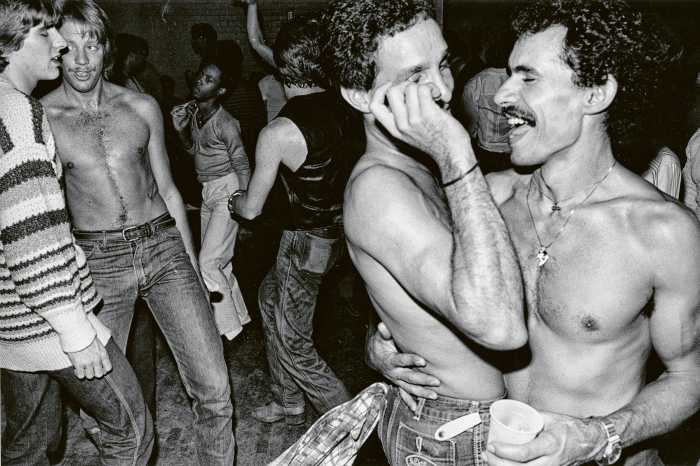“Familles, je vous hais” (“Families, I hate you!”). So said that great French pooftah André Gide, the 1947 Nobel Laureate for literature who was vilified for most of his life as an apostle of pederasty.
And it’s a sentiment that so many gay people have at times shared, so often victimized as we have been by our biological families, shunned and otherwise subjected to a thousand cruelties both evidently brutal or more subtly invidious, yet nonetheless soul-destroying and dehumanizing.
In “Ties That Bind: Familial Homophobia and Its Consequences,” just published this week by New Press, the brilliant Sarah Schulman dissects the family not only as one of the most important loci of societal homophobia, but as even perhaps the most important. Although “familial homophobia is something that gay people discuss with each other with a regular, daily urgency,” Schulman observes, “it has not made it into the official public discourse. In some ways it is our most important story,” yet it remains largely a secret that is too little discussed or analyzed.
Sarah Schulman examines where all the homophobia begins
But “the family is where most gay people experience homophobia for the first time. It is the model for social exclusion; for it is also where most straight people learn to use homophobia to elevate themselves within the family politic, which is the prototype of the broader social politic.”
Over two-and-a-half decades, Schulman has been one of queer culture’s most prolific and admirable adornments. She is both an accomplished artist and a public intellectual —— honored with both the Guggenheim and the Fulbright, and with the American Library Association’s Book Awards for both fiction and nonfiction, Schulman is the author of nine novels, numerous plays, and four nonfiction books (including the scintillating “My American History: Lesbian and Gay life During the Reagan-Bush Years”), which she churns out from her base as a professor of English at CUNY’s College of Staten Island, where she has laudably accepted the Sisyphean task of trying to make the children of the Irish and Italian working classes not only think, but think outside the box, when they have an ingrained reluctance to recognize that not everything on television is true.
Not only has she also found the time over the years to write a steady stream of articles in both the straight and gay press, but she’s been an unquenchable activist as well, playing a leading role in ACT UP, getting arrested when she was part of a group of women who disrupted Senator Jesse Helms’ biased anti-abortion hearings in Washington, and co-founding Lesbian Avengers in the early ’90s, to mention just a few of her many militant credentials.
Given her rich life and the wide range of her artistic explorations, it is not surprising that “Ties That Bind” does so much more than deconstruct and demystify familial homophobia and its consequences. A child of the feminist revolution, Schulman has absorbed the valuable feminist teaching that “the personal is political,” and examples taken from her own experience are woven throughout this book, which frequently sparkles with her considerable wit and whose machine-gunning of conventional wisdoms, within and outside the gay world, rivets our attention.
“Ties that Bind” is also a sharp-eyed exercise in cultural criticism, a powerful polemic against lesbian invisibility, a guide to personal emotional survival in homophobic environments within and outside the family, and a bracing and concretely radical social-political critique that points the way to a utopian future in which straight people are called upon to accept unflinching responsibility for ending the myriad harms they inflict on us by accepting a diminution of their own power.
In short, “Ties That Bind” is one of the most exciting gay liberation texts to appear in years.
Schulman points out that “one of the most pervasive uses of homophobia within a family is by family members who actually have no inherent prejudices toward gay people but manipulate their family’s prejudices to achieve greater currency internally. It’s like the folks who didn’t really care about Communism but denounced others to the blacklist to win promotion in their fields. They exploit prejudicial systems for their own advancement, even if they are not ideologically committed to those systems.”
The impact of familial homophobia on gay people’s self-image, behavior, and relationships, and of how it and the lies and myths that are constantly iterated against us turn too many of us into pathetically suppliant assimilationists, are some of the most refreshing in the book, sure to raise the hackles of the gay bourgeoisie.
For example, she writes: “Today, in an act of diminishment, gay people use having children as proof that we deserve rights, respect, and representation. This of course reveals that our lack of children is a sign that something is wrong with us, that we are dangerous and deserve to be outside of power. This false accusation is another smoke screen, obscuring the real issue: that depriving children of relationships with gay people is itself child abuse.”
And Schulman argues, “The system of supremacy into which straight people are inaugurated is so pervasive, so dominant in its invisibility, and therefore unidentifiable, that parents and siblings and other relatives are often not individual enough to transcend its inherent cruelties. Instead they reinforce them to greater or lesser extents, and because we love our parents, we make excuses or try to help them expand their thinking, often without fully acknowledging the impact of their prejudices on our emotional lives. The greatest of which is to continue their dirty work in our treatment of each other.”
One of the most controversial parts of Schulman’s book is bound to be her denunciation of the “false discourse of tolerance” and her explication of why “homophobia is not a phobia at all, it is a pleasure system.” Schulman proposes that the strategic belief that visibility for queers, by demystifying homosexuality and ending fear of it, would end homophobia was a misplaced “engagement with magical thinking.”
Instead, she says, “What is most difficult to face but increasingly obvious as gay visibility provokes containment, but not equality, is that homophobes enjoy feeling superior, rely on the pleasure of enacting their superiority, and go out of their way to resist change that would deflate their sense of superiority. Homophobia makes heterosexuals feel better about themselves. It’s not fear — it’s fun.”
Schulman sees gay marriage as “a balance to the deprivation of recognition created by the family… a strategy to prevent or dilute the tension created by withholding and shunning both from family and from lover.” While insisting on queers’ absolute human right to marriage equality, she suggests why, “in some ways, gay marriage is a sign of spiritual exhaustion. It is a way to get out of the trenches, the white flag of surrender that can bring the tired soldier to a hot shower and a bowl of gruel.”
Schulman spares nobody in this book: from Barack Obama to Melissa Etheridge to the editors of gay magazines, they all come in for a justified thumping. And it’s sobering to be tartly reminded that “there is no lesbian play in the American repertoire” (unless one counts “The Children’s Hour,” which Schulman doesn’t) and that since the publication of Rita Mae Brown’s “Rubyfruit Jungle” in 1973, “the only overtly lesbian protagonists allowed on mainstream America’s bookshelves were from Britain” — those from Jeanette Winterson and Sarah Waters.)
“Ties that Bind” is angry without being strident. And in these days when so much official gay discourse strains to be decorous, I for one revel in Schulman’s vindicable anger, although it will probably lead to the book’s being dismissed by mainstream reviewers who disdain that which is likely to derange — if it’s reviewed by them at all, for the ignoring of unapologetically gay books by the mainstream press is all too common.
That’s a great pity, for this is a rewarding, wide-ranging, and challenging work from an original mind and a talented pen, one that will make you think and help you live. Queers should stuff it in their parents’ Christmas stockings. Lovers should give it to each other, and talk about its lessons. Because ultimately, Schulman’s righteous anger is both informative and healing, and “Ties that Bind” is a bravura performance.
On November 12 at 6:30 p.m., Sarah Schulman will deliver the annual David Kessler Lecture in LGBTQ Studies at the CUNY Graduate Center’s Proshansky Auditorium, 365 Fifth Avenue at East 35th Street. (Best to RSVP: clagsevents@gc.cuny.edu.) The Kessler Lecture and Award honors a scholar, artist, or activist who has, over a number of years, produced a substantive body of work that has had a significant influence on the field of GLBTQ Studies. On Monday, November 16 at 7:00 p.m., there will be “An Evening with Sarah Schulman” at the Housing Works Bookstore Café, 126 Crosby Street, between Prince and Houston Streets, sponsored by CUNY’s Center for Gay and Lesbian Studies (CLAGS )— tickets are $15, with proceeds going to CLAGS. RSVP to clagsdevelopment@gc.cuny.edu. Doug Ireland can be reached through his blog, DIRELAND, at http://direland.typepad.com/.
Complete Information:
TIES THAT BIND: FAMILIAL HOMOPHOBIA AND ITS CONSEQUENCES
By Sarah Schulman
New Press
$23.95; 192 pages
































